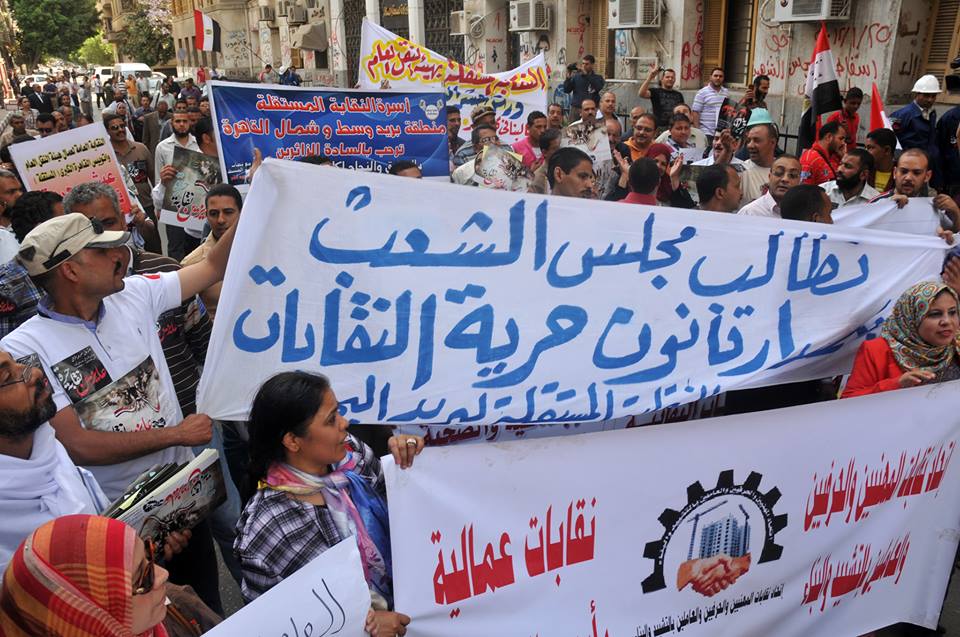Egypt’s Trade Union Law: Closing in on Egypt’s Trade Union Movement

In another step restricting the right to organize, Egyptian Parliament approved a draft law submitted by the government on “trade union organizations and the protection of the right to organize”.[1] The law, approved on December 5, 2017, comes on the heels of the ratification of the Non-Governmental Organizations Law. The newly-approved Law on Freedom of Association was the subject of considerable social debate six years ago when independent trade union leaders were exposed to abuse, dismissal, and non-recognition as representatives of their union members by the state and business owners. Independent unions and civil society organizations have strongly opposed the bill,[2] calling it a masked attempt by the government to revive the current law even though it had expired years ago.[3] They also considered that overall, the draft law fell short of keeping up with the requirements of legislative change called for by economic and social developments, labor market terminology, and changes in the labor sector. These changes require the government and parliament to respond to Egypt’s obligations under the International Labor Organization (ILO) Convention and remarks.
Blacklisting Egypt
Despite the fact that the ILO expressed its reservations about 13 articles of the draft law before it was presented to the Manpower Committee in parliament,[4] the new law was a reproduction of the old one, reflecting the government’s intention to make independent unions illegal. At its Geneva conference last June, the ILO placed Egypt on the list of short-term notes, known as “the blacklist”, for countries that violate international labor standards. Reasons for blacklisting Egypt include the current trade union law which prohibits workers from freely organizing themselves in independent unions and forcing workers to join the only labor union: the Egyptian Trade Union Federation (ETUF), which has dominated the trade union movement since its establishment in 1957. Mandatory ETUF affiliation fees are also deducted from workers’ salaries. This law also violates international conventions 87[5] and 98[6] signed by Egypt, which allow for trade union pluralism. Adding Egypt to the list also comes at a time when the government has renewed its crackdown on labor protests which has led to the dismissal and arrest of dozens of trade union leaders.[7]
In 2011, the ILO removed Egypt from its blacklist (Egypt had been blacklisted since 2008) following the Egyptian government’s declaration of the freedom of association, which allowed the establishment of dozens of independent syndicates upon submission of their papers at the Ministry of Labor. However, Egypt was blacklisted again under former President Mohamed Morsi, after he tightened the noose on independent trade union organizations.
Acquiring a Juridical Personality: the Key to the Dissolution of Independent Unions
The first criticism was made against Article 3 of the law. The article discriminates between unions of the ETUF and independent trade unions. The former will retain their juridical personality and current organization after the law enters into force. Independent trade unions, on the other hand, cannot acquire their legal personality except if they restructure and reconstitute themselves under the law’s provisions which impose prohibitive conditions. If they fail to do so, they will be subject to dissolution within 60 days from the day the regulation enters into force. Moreover, Article 11 of the law prohibits the formation of more than one trade union committee per association. A combination of these two factors would effectively prohibit the formation of any syndicate in associations where ETUF unions exist. This prohibition is a violation of Article 76 of the Egyptian Constitution, which gives workers the right to establish their unions freely on a democratic basis and without interference.[8]
Depriving Certain Categories of Forming Trade Unions
Article 2 enumerates the categories to which the law applies exclusively, deliberately excluding some sectors like fishermen and pensioners. The law ignored the rights of these sectors to form syndicates, despite the distinguished experience of the current General Union of Pensioners which has competently represented the interests and demands of its members. Article 11 stipulates that a quorum of 150 members is required to establish a trade union committee. This condition deprives employees in enterprises of less than 150 workers of forming their own trade union committees. This means that such enterprises, which account for a significant proportion of establishments, will be excluded.
This cut-off number was the subject of discussion before parliament. While parliament initially approved an increase in the number to 250 workers, the Manpower Committee requested that the number needed to form a trade union committee should be 50, as it had been since 2011.[9] The minister of manpower stated that too high a figure will reduce the number of trade unions from more than 4000 to 2240 committees. During the final voting, the government requested a re-deliberation, proposing that the number be limited to 100 workers. The majority of MPs who are businessmen maintained an intransigent position, prompting the speaker of parliament’s intervention.[10] He proposed the compromise of 150 members.[11]
It should be noted that, according to the ILO, it is preferable not to require a certain number of members for the establishment of a union. If necessary – from the viewpoint of the national legislator – this number should not exceed 20 members so that regulation of this right would not result in its abrogation.[12]
Abolition of Regional Federations and a Singular Hierarchical Structure of Organization
Article 10 of the draft law keeps the same hierarchical structure as in the previous law. A single trade union structure is imposed at three levels: a trade union committee at the level of enterprise or governorate, a general trade union at the level of the republic, and a general federation of trade unions comprising all syndicates. This hierarchical structure copied from the previous law has been subject to criticism, rejection, and key observations by the ILO Committee of Experts over its violation of labor standards and international labor conventions. Such a structure ignores the reality of the current trade union movement in Egypt,[13] where there are syndicates that do not belong to a general trade union, or general trade unions that refuse to join any federation. This is tantamount to interference on the part of the legislator to force trade union organizations to organize under one indispensable administrative structure, with no way out. Moreover, this structure ignores qualitative (sectoral) unions and regional associations despite their actual formation over the past years and non-recognition as a formula for a trade union federation. This reflects the [state] authority’s persistence to impose its control over trade union organizations.
The General Assembly of the Fatwa and Legislation of the State Council maintained that imposing a unified structure on the labor movement and depriving it of its freedom of association in establishing other organizations, in the absence of the social necessity of this text, makes it legislatively flawed.[14]
Article 12 sets out impossible conditions that hinder union committees from exercising their right to unity and formation of trade unions and national federations. These conditions stipulate the need for the general trade union to include no less than 15 union committees with the membership of at least 20 thousand workers. They also stipulate that a trade union federation should have no less than 10 general unions with the membership of at least 2,000 workers. These figures represent a restriction on the exercise of the right to form trade unions and federations in general.
Article 41 gives union members of the board of directors the right to continue occupying their posts after retirement. This is discriminatory to other members of the union who do not have this right. This matter raises a lot of controversy due to suspicions of conflict of interest, as some members of the trade union committee directly benefit from this text.
The Manpower Committee took into account the ILO Committee of Expert’s remarks by rendering the financial and administrative regulations issued by the competent minister consultative in nature rather than obligatory, as was previously ordained. However, trade unionists criticized their inclusion in the law on the grounds that it is unjustified as long as they are only intended to provide technical support to syndicates.
Abusing Unionists
In addition to the elimination of independent trade union organizations, the law includes penalties of imprisonment and fines against trade union workers, most notably the penalty stated in Article 69 which stipulates imprisonment of any person who establishes or participates in the management or establishment of an enterprise, association, organization, or a league and calls it a syndicate; or conducts an activity that is only limited to trade union members and board of directors in accordance with the provisions of the law. This text is particularly directed at unionists who are members of independent trade unions formed before the issuance of this law, and who adhere to their right to manage their union organizations without settling their statuses under the impossible conditions stipulated in the bill. On the other hand, it is worth noting that the law stipulates a limited fine against businessmen and employers in the event of violation.
Representation of Women
In a meeting of the Manpower Committee during the discussion of the bill, MP Jalila Othman called for women representation on the board of directors of trade unions (a minimum of one woman), since the Constitution guarantees the right of representation of women in different councils.[15] However, this proposal failed to muster support by some unionists and some members of parliament alike. The ETUF legal counselor stated that the Constitution provides for the representation of women in parliamentary assemblies, not labor councils. MP Mohamed Wahballah, on the other hand, expressed his concern over some exclusively male-dominated industries. Thus, Article 35 of the law stipulates the following: “To have due regard to the representation of women and youth in councils, whenever possible”. This vague phrasing allows for the exclusion of women from the membership of trade union councils.
Conclusion
This law is a continuation of the Egyptian authority’s approach to issue acts that confiscate freedoms and deprive all categories of society of their right to organize, form or join trade unions in order to enhance, protect and defend their economic and social interests, and negotiate fair wages and decent working conditions. This right is guaranteed by the Constitution and all international conventions. In addition, the restrictions stated in the law do not fall under the “necessary” conditions set by international covenants and conventions. Instead, they have gone so far as to restrict fundamental freedoms enshrined in the Constitution. This law will also lead to non-organization of trade unions as they are denied the right to build independent syndicates and are obligated to follow one state-controlled organization that does not reflect their interests. This renders the working class without a platform to defend their rights. Additionally, adoption of this law will lead to continued inclusion of Egypt on the ILO blacklist for its continued violation of workers’ rights.
This article is an edited translation from Arabic.
________________________________________
[1] See: Sameh Lashin’s, “Nanshor Nass Qanun al-Monazzamat al-ʿommaliyya…Kayfa Tanʾa al-Lijan al-Naqabiyya Binafsiha ʿan al-Habs Wal Gharama?”, press release on Ahram Gate,December 6, 2017.
[2] Egypt’s workers have adopted the term: “independent trade unions” to face the ETUF-affiliated unions that they referred to as “the governmental union”, indicating these unions’ blatant affiliation to executive authority and the ETUF abandonment of defending the interests of the Egyptian working class. The establishment of independent unions began in the wake of the January Revolution after then Minister of Labor and Immigration, Ahmed al-Borai, announced the Declaration of Freedom of Association issued by the Ministry of Manpower in March 2011. The Egyptian government was committed to implementing the Convention on Freedom of Association and Protection of the Right to Organize No. 87 of 1957.
[3] Law No.35 of 1976 on Trade Unions, published in the Official Gazette No.22.
[4] See: Ahmed Braik and Ahmed Kassab’s, “Al-ʿamal al-Dawliyya Tatahaffaz ʿala Qanun al-Naqabat al-ʿommaliyya, Wa Saʿfan: Al-Mashrouʿ Amam al-Barlaman”, press release in Al-Shorouq, March 4, 2017.
[5] The Convention on Freedom of Association and Protection of the Right to Organize No.87, issued by the ILO and ratified by the Egyptian Government on November 6, 1957.
[6] The Convention on the Right to Organize and Collective Bargaining No.98 of 1949.
[7] For example: the arrest of 5 employees of the Egyptian Postal Authority in Alexandria on March 25, 2014; the arrest of 32 workers from the Tura Cement Company June 2017; the arrest of 8 workers from the Aswan Cement Company July 2017; the arrest of 7 members of the Board of Directors of the Real Estate Tax Union September 2017; and the arrest of 6 unionists at Sinmar Chemical Plant in Port Said November 2017.
[8] Article 76 of the current Egyptian Constitution reads: “The establishment of federations and syndicates on a democratic basis is a right guaranteed by law. Such federations and syndicates will possess legal personality, be able to practice their activities freely, contribute to improving the skills of its members, defend their rights, and protect their interests. The state guarantees the independence of all federations and syndicates. The boards of directors thereof may only be dissolved by a judicial ruling. Syndicates may not be established within governmental bodies”.
[9] The draft law was approved by parliament’s Manpower Committee in early November after reducing the number of workers needed to form a trade union committee, as per the government’s proposal, from 100 to only 50 workers.
[10] Current Speaker of Egyptian Parliament, Dr. Ali Abdel-Aal.
[11] See: Nour Ali’s, “Al-Barlaman Yuwafiq Nihaʾiyyan ʿala Taʿdil Qanun al-Tanzimat al-Naqabiyya”, press release in Youm7, December 5, 2017.
[12] ILO Committee on Freedom of Association in its report No.90, case 224, para. 194.
[13] Egyptian workers formed many independent unions (regional and qualitative) away from the ETUF in various governorates, such as the Union of Workers of Sadat, the Union of Suez and Port Said Workers, the Permanent Conference of Alexandria Workers, the Egyptian Federation of Independent Trade Unions, and the Egyptian Democratic Union.
[14] Fatwa of the General Assembly of Fatwa and Legislation of the Council of State No. 88/1/56 on July 20, 1994.
[15] See: Rania Rabie’s, “Jadal Hawla Tamthil al-Marʾa Bimajales al-Naqabat al-ʿommaliyya”, press release in Al-Shorouk,October 30, 2017.



